Cronos (1993)

It turns out I loved Guillermo del Toro before I hated him. I just didn't know it yet. Of course, that was before I fell in love with him again.
Let me explain. Initially I knew del Toro, the Mexican-born filmmaker, only through his first American films, "Mimic," "Blade II" and "Hellboy." And I didn't particularly like them. While I didn't despise them, I wondered why my friends and colleagues were so taken with del Toro's visual style and storytelling abilities when their appeal eluded me.
"Hellboy" in particular struck me as one of those movies that could've been much better than it was. It took a great concept and comic book character and turned it into a film that seemed flat and overwhelmed by its special effects. (I didn't care for the 2008 sequel, either.)
But then came 2006 and "Pan's Labyrinth," and I was bowled over. It was by far my favorite film of the year, filled with tenderness and innocence, and yet heralded an imagination filled with gloom and human darkness.
When it was announced that del Toro would helm the film version of J.R.R. Tolkien's "The Hobbit," I was overjoyed. His sensibility was the perfect combination of childlike wonder and nightmarish terror. I could only vibrate with anticipation at what the Smaug scenes would be like. (Alas, things fell through, and del Toro withdrew from the project in favor of producer and "The Lord of the Rings" director Peter Jackson.)
After "Pan's Labyrinth," I also was able to go back and start watching some of del Toro's early work in his native country. 2001's "The Devil's Backbone" was a terrific picture, again delving into mind of a child who experiences horrible adult-made terrors. The only thing left was to see his very first feature, 1993's "Cronos."
Events conspired. No video version of "Cronos" was available in the U.S. that I could track down, and the movie languished on my Netflix wishlist for two years. Then, out of the blue, it appeared in the mail. The Criterion Collection had issued its own version.
It's a low-budget horror/fantasy with some rough edges, but "Cronos" already reveals the dark genius of del Toro's fecund mind.
It stars Federico Luppi as Jesus Gris, an elderly antiques dealer who unearths a strange golden device created by a 16th-century alchemist. Resembling the shell of an insect, the Cronos attaches itself to Jesus' body and slowly but inexorably begins to change him.
It's not a standard vampire movie, but there's obvious similarities to the vampire legends. Jesus finds himself filled with an insatiable lust for blood — even following a man with a nosebleed into the restroom and licking the spilled drops of crimson off the bathroom floor. Sunlight also hurts him, and he learns the hard way that even the most horrifying injury will not kill him so long as his heart is not pierced.
The framing story involves De la Guardia (Claudio Brook), a mobster who is dying of various ailments and wants the Cronos to grant him immortality. His right-hand-man is his thuggish nephew Angel, played by Ron Perlman, who dresses in pinstripes and speaks in a mix of Spanish and Americanized English.
Jesus is a kind and decent man and reserves his greatest love for his granddaughter, Aurora (Tamara Shanath). She serves as the film's silent Greek chorus, adoring her grandfather even when his skin begins to rot and he drinks human blood in her presence.
The atmospherics of "Cronos" are black and rich, and we feel the impending doom hurtling down upon poor Jesus. The special effects are somewhat lackluster, though. Though the Cronos device itself is convincing enough, the slipshod makeup used to depict Jesus' decay is borderline humorous. Ditto for the supposed interior shots of the Cronos, where some evil bug is supposed to live.
Still, "Cronos" was good enough to justify the long wait, and serves to remind me that you shouldn't always judge a book by its cover — or a new director who has to make a few commercial flicks before turning to the kind of moviemaking he really wants to do.
4 Yaps



